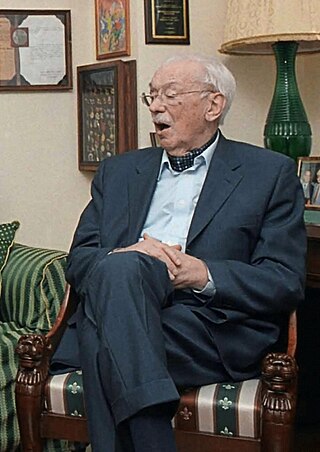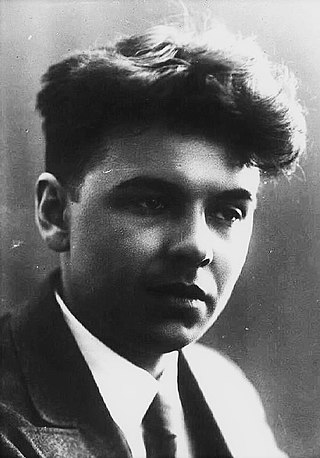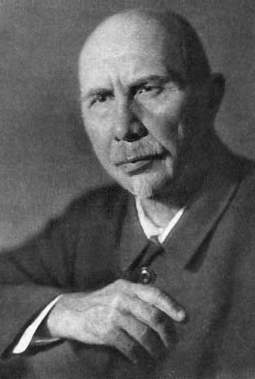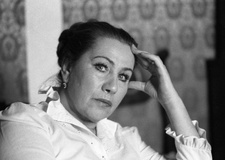
Sergey Vladimirovich Mikhalkov was a Soviet and Russian author of children's books and satirical fables. He wrote the lyrics for the Soviet and Russian national anthems.

Leonid Maksimovich Leonov was a Soviet novelist and playwright of socialist realism. His works have been compared with Dostoevsky's deep psychological torment.

Robert Ivanovich Rozhdestvensky was a Soviet-Russian poet and songwriter who broke with socialist realism in the 1950s–1960s during the Khrushchev Thaw and, along with such poets as Andrei Voznesensky, Yevgeny Yevtushenko, and Bella Akhmadulina, pioneered a newer, fresher, and freer style of poetry in the Soviet Union.

Viktor Petrovich Astafyev also spelled Astafiev or Astaf'ev, was a Soviet and Russian writer, playwright and screenwriter. He was recognized with the title Hero of Socialist Labour in 1989.
Sergey Pavlovich Urusevsky was a Soviet cinematographer and film director, renowned for his work with Grigori Chukhrai, Mikhail Kalatozov and Yuli Raizman. His subjective camera style in I Am Cuba and The Cranes Are Flying is regarded as one of the best of all time, winning him several awards throughout his career. Urusevsky's work draws influence from Eduard Tisse, the cinematographer known for his work with Sergei Eisenstein on the film Strike.

Aleksej Vladimirovich Vysotsky was a Soviet Union journalist and author, as well as a hero of World War II who attained the rank of Colonel.

Oleksandr "Oles" Terentiiovych Honchar was a Soviet and Ukrainian writer and public figure. He also was a veteran of World War II and member of the Ukrainian parliament.

Alexander Serafimovich was a Russian/Soviet writer and a member of the Moscow literary group Sreda.

Yuri Vasilyevich Bondarev was a Soviet and Russian writer and screenwriter. He was best known for co-authoring the script for the serial film franchise Liberation (1968–71).

Vasily Ivanovich Belov was a Soviet and Russian writer, poet and dramatist, who published more than sixty books which sold seven million copies. A prominent member of the influential 1970s–1980s derevenschiki movement, Belov's best known novels include Business as Usual, Eves, The Best is Yet to Come and The Year of a Major Breakdown.

Dmitry Borisovich Kabalevsky was a Soviet composer, conductor, pianist and pedagogue of Russian gentry descent.

Mikhail Nikolayevich Alekseyev was a Russian Soviet writer and editor, writing mostly about the Great Patriotic War and the life of Soviet peasantry. His controversial Fighters (1981) novel was one of the few non-dissident works of the time to bring about the issue of the 1933 Soviet famine. In 1969-1990 Alekseyev edited Moskva magazine.

Sergey Sergeyevich Smirnov was a Soviet writer, a historian, a radio- and TV-presenter, a public figure, a Lenin Prize winner (1965). Member of the RCP(b) since 1946.
Yuri Andreyevich Zhelyabuzhsky was a Russian and Soviet cinematographer, film director, screenwriter and animator, film theorist and professor at VGIK.

Galina Mikhailovna Shergova was a Soviet and Russian writer who participated in the creation of more than 200 films and TV movies. In 1978, she was the winner of the USSR State Prize.
Mikhail Kuzmich Lukonin was a Soviet and Russian poet, writer and war correspondent. He was born in Kilinchi and in his youth worked in the Stalingrad Tractor Plant. He started publishing poetry in his teens. He attended the Gorky Institute of Literature from 1937 to 1941. He was a veteran of the Winter War and also worked as a war correspondent in the Great Patriotic War. In October 1941, he was wounded in the village of Negino. The following year, he joined the Communist Party.

Gennady Gabaydulovich Gabaidulin was an officer in the Red Army who was awarded the title Hero of the Soviet Union for his bravery during the fighting for Rzhev in 1942.

Ilo Onysymovych Mosashvili was a Georgian and Soviet writer, playwright and translator.
Semyon Semyonovich Shkolnikov was a Soviet and later Estonian cinematographer, director, screenwriter, and front-line cameraman during the Great Patriotic War. He was awarded the title of People's Artist of the Estonian SSR (1978), and was the laureate of three Stalin Prize, the Nika Prize (2005), and the Guild of Cinematographers' White Square Prize (2005).
Georgi Mokeevich Markov was Soviet novelist, playwright, screenwriter, journalist and public figure.














